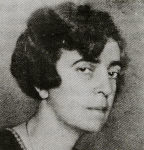Avra Theodoropoulou facts for kids
Quick facts for kids
Avra Theodoropoulou
|
|
|---|---|
 |
|
| Born |
Avra Drakopoulou
3 November 1880 Edirne, Ottoman Empire
|
| Died | 20 January 1963 (aged 82) Athens, Greece
|
| Nationality | Greek |
| Occupation | music critic, pianist, women's rights activist |
| Years active | 1900–1958 |
Avra Theodoropoulou (born Avra Drakopoulou; 3 November 1880 – 20 January 1963) was an important Greek woman. She was a talented music teacher and pianist. She also fought for women's rights. She helped women get the right to vote. In 1920, she started the League for Women's Rights. She led this group for many years, from 1920 to 1957. Avra was married to a poet named Agis Theros.
Contents
Early Life and Education
Avra Drakopoulou was born on November 3, 1880. Her birthplace was Edirne, which was part of the Ottoman Empire then. Her father, Aristomenis Drakopoulos, was a Greek official. Her mother's name was Eleni. Avra had a sister, Theone Drakopoulou. Theone became a famous poet and actress.
As a child, Avra's family lived in Turkey and Crete. Later, they moved to Athens, Greece. Avra finished high school and learned three languages. She could speak English, French, and German. In 1897, she volunteered as a nurse. This was during the Greco-Turkish War.
In 1900, Avra graduated from the Athens Conservatoire. This was a music school. That same year, she met Spyros Theodoropoulos. He later became a politician and writer. He used the pen name Agis Theros. Avra and Spyros got married in 1906. Her father had not wanted them to marry at first.
Starting Her Career
Avra Theodoropoulou was a very skilled pianist. In 1910, she won a special silver medal for her piano playing. She then became a teacher at the conservatoire. She taught music history and piano.
Avra also enjoyed writing plays. In 1906, she wrote a play called Chance or Will. Another play, Sparks Dying Out, was performed in 1912.
In 1911, she helped start a group. It was called the Sunday School for Working Women. This group was important because it said women deserved education. This was a new idea at the time.
During the Balkan War (1912–1913), Avra helped again as a nurse. She received several awards for her brave work. These included the Medal of the Hellenic Red Cross.
Fighting for Women's Rights
In 1918, Avra helped create "Sister of the Soldier." This group helped with problems caused by war. It also wanted women to have more rights. They wanted women to be able to vote. They also wanted women to have political rights.
In 1919, Avra left the Athens Conservatoire. She started teaching at the Hellenic Conservatory. A year later, in 1920, she did something very important. She, along with other women, started the League for Women's Rights. This group worked to get equal rights for women. They joined with the International Alliance of Women (IWSA). This helped them push for equality on a global scale.
The League for Women's Rights quickly became a strong voice in Greece. In 1920, Avra asked the Greek government to change laws. She wanted women to have the right to vote. The next year, she became the president of the League. She stayed president until 1958. The group was banned during World War II, but she returned to lead it after the war.
Helping Refugees and International Work
After 1922, Avra focused on helping refugees. Many people needed help after the Greco-Turkish War. The League's volunteers helped in many refugee camps. Avra also helped run an orphanage. It was called the National Shelter and cared for many girls.
In 1923, the League started its own newspaper. It was called Woman's Struggle. Avra also traveled to Rome for a big conference. It was the 9th conference of the IWSA. She became a board member of the IWSA. She served on the board until 1935.
At this conference, she met other feminists. She then helped create the Little Entente of Women (LEW). This group included women from Czechoslovakia, Greece, Poland, Romania, and Yugoslavia. She was honored with a medal for her work for peace. Avra helped organize their yearly meetings. She led the Greek LEW from 1925 to 1927.
Avra's hard work paid off in Greece. In 1930, educated Greek women gained a new right. They could vote for local officials. This was a big step forward.
Later Years and Legacy
In 1936, Avra started teaching at the National Conservatoire. That same year, Greece came under a dictatorship. The new government stopped women's organizations. Avra continued to help during the occupation. She volunteered as a nurse during the war resistance.
In 1946, she became president of a new group. It was called the Panhellenic Federation of Women (POG). This group tried to unite all women's organizations. They held a large meeting in Athens. However, the Greek Civil War started soon after. Avra resigned because she believed the women's movement should be neutral.
Because of her past activities, Avra faced challenges. She had to sign a loyalty oath in 1948. Authorities also kept records on her and her husband. These records were kept until 1989.
After the Civil War, Avra continued her international work. She attended many IWSA conferences. These included meetings in Amsterdam (1949) and Stockholm (1951). Finally, in 1952, Greek women won the full right to vote. This was a huge victory for Avra and her work.
Avra retired from teaching in 1957. She also stepped down from the League for Women's Rights in 1958. In her later years, she wrote about music for newspapers and magazines. Her husband died in 1961. After that, she organized their important papers and records. Avra Theodoropoulou passed away in Athens on January 20, 1963. Her life showed how one person can make a big difference for others.
See also
 In Spanish: Avra Theodoropoulou para niños
In Spanish: Avra Theodoropoulou para niños

